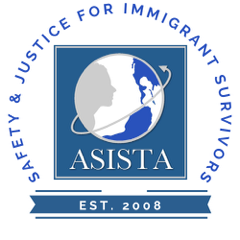As VAWA Turns 30, Dangerous Political Rhetoric Continues to Threaten Immigrant Survivors
By Cristina Velez, Veronica Sainz, and Kirsten Rambo
Thirty years ago, the landmark Violence Against Women Act was signed into law, marking a giant leap forward in the struggle to end gender-based violence (GBV). Today, as we celebrate this milestone anniversary, we do so in the midst of an election season unfortunately marked by dangerous rhetoric that reminds us just how much further we must go to achieve racial and gender justice. For many, including immigrant survivors of GBV, these tired tropes are far more than just words: they have real and dangerous consequences.
Retrograde narratives about gender, race, and immigrants portend failed policies that deepen inequalities. Back in 1992, Los Angeles police officers were acquitted for the infamous beating of Rodney King. In what came to be known as “the Murphy Brown speech,” then-Vice President Dan Quayle attributed the resulting civil unrest not to a sense of collective outrage and despair borne of centuries of racial violence and injustice–but to the breakdown of the traditional family structure and the “narcotic of welfare.” He ended his speech by railing against the depiction of a single working woman’s choice to become a mother, in the popular television show “Murphy Brown.” In the years that followed, during the Clinton administration, sweeping rewrites of welfare, criminal, and immigration laws ushered in a long period of backlash against America’s changing demographics, leading to our current broken systems of care and accountability.
Sadly, current Republican Vice-Presidential nominee J.D. Vance’s past comments echo those of Quayle. In public statements from 2021, Mr. Vance complained that the nation’s problems stemmed from a proliferation of “childless cat-ladies;” referred to unwanted pregnancies resulting from rape or incest as “inconveniences;” and suggested that children benefit when parents remain in unhappy, even violent, marriages. Through such statements as well as his policy preferences, Mr. Vance makes it clear that he idealizes childbearing within heterosexual marriage–no matter the danger–as the solution to various social and economic ills, while degrading and punishing other types of households and families.
We know, however, that benefits predicated on marriage only deepen the isolation of survivors and trap them in violent homes. This recognition, in fact, was the root of the landmark, bipartisan VAWA legislation and later, the development of the U nonimmigrant visa. Researchers have found that a decline in the marriage rate, better access to services for survivors, and improvements in the economic status of women have actually contributed to a decline in the national rate of nonfatal domestic violence.
Facts like these appear to matter little to those pushing narratives that seek to degrade and dehumanize. Racist, xenophobic, and misogynist messaging may be heightened during election season, as candidates seek to mobilize votes by whipping up fear of fabricated scapegoats and bogeymen. The consequences can be profound, threatening immigrant survivors’ safety and very existence in this country. During the prior administration, vicious anti-immigrant rhetoric coupled with increased and arbitrary enforcement had palpable consequences, causing immigrant survivors to fear coming forward to report violence against them and obtain services that could have helped them to get safe. In recent weeks, the town of Springfield, Ohio has been harmed by the knowingly false allegations of the Republican presidential and vice-presidential candidates that Haitian immigrants in that community were eating the pets of their neighbors. Absurd? Of course. But the words have remarkable power nonetheless, and have led to bomb threats that resulted in the closure of schools and city buildings and the canceling of public events. Words were enough to disrupt an entire city, and cause the local Haitian community to consider leaving despite their legal, protected status. When a comedian at Trump’s recent Madison Square Garden rally referred to Puerto Rico as “a floating island of garbage,” his words undermined the worth of an entire community. Other rally speakers went on to repeat harmful stereotypes about Black, Latino, Jewish, and Palestinian people, perpetuating misunderstanding and fear of others. At the same time, vulgar social media posts sexualizing Vice President Harris and former Secretary of State Hillary Clinton have become a popular tool of their political opponents, in an attempt to deny these women their dignity and accomplishments.
As hateful, fear-mongering rhetoric continues to ramp up this election season, consider the impact of these words on immigrant survivors of GBV. Through media feeds and informal networks, the echoes of these attacks reverberate loudly with immigrant survivors, who are reminded regularly that their safety in this country is far from guaranteed, and may well wonder: If this is how they treat people with status and power, what will they do to us? At ASISTA, we celebrate the tremendous, lifesaving impact of VAWA, and we recommit ourselves to the challenge of ensuring that immigrant survivors find safety and justice in this country, rather than cowardly, dangerous rhetoric that demeans us all.
